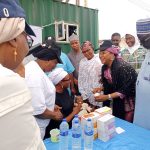Media Rights Agenda (MRA) expressed concerns on Monday about the significant violations of media freedom under President Bola Tinubu’s administration, labelling this trend as alarming, with 141 cases reported.
According to the rights organisation, many of these freedom violations under Tinubu’s administration are carried out by law enforcement agencies to silence or punish journalists and government critics.
This was made known in a press release by MRA’s Communications Officer, Idowu Adewale, on Monday.
The report, titled “The Onslaught Intensifies: A Mid-term Assessment Report on Media Freedom under the Tinubu Administration,” documents 141 incidents that occurred between May 29, 2023, and May 29, 2025.
Media Rights Agenda is an independent, non-governmental organisation dedicated to promoting and protecting the right to freedom of expression, media freedom, access to information, and digital rights.
In analysing the freedom violations incidents under Tinubu’s administration, Adewale noted that 61 cases (43.26 per cent) were perpetrated by operatives of the Nigeria Police, while the Department of State Services (DSS) was accountable for seven cases (4.96 per cent).
Together, these two agencies account for nearly half of all documented violations of media rights and freedom of expression in the country over the past two years, MRA noted.
The organisation argued that the Tinubu Administration bears legal responsibility for all of these incidents, in accordance with Principle 20(5) of the Declaration of Principles on Freedom of Expression and Access to Information in Africa, which holds that States are “liable for the conduct of law enforcement, security, intelligence, military and other personnel which threatens, undermines or violates the safety of journalists and other media practitioners.”
In a Preface to the report, MRA’s Executive Director, Mr. Edetaen Ojo, said: “we are seeing threats to media freedom in Nigeria through the continued implementation of repressive laws, such as the Cybercrime Act which is frequently used to target, silence or punish journalists; the enforcement of politically motivated regulatory sanctions; arrests and detention or other forms of attacks on journalists; surveillance or intimidation of media practitioners; and censorship of government-controlled broadcasters, among others threats and attacks.”
Describing the report as a “timely intervention in a political climate where democratic gains continue to face increasing threats from censorship, regulatory overreach, violence against journalists, and the misuse of digital surveillance technologies,” Mr. Ojo explained that its objective “is not merely to criticize but to document, analyse, and illuminate the extent to which the current administration has either advanced or undermined the freedom of expression landscape in Nigeria.”
MRA said among the most disturbing findings in the report was the continued abuse of the Cybercrimes (Prohibition, Prevention, etc.) of 2015, as amended, particularly its controversial Section 24, which law enforcement agencies have exploited to arrest, detain, and prosecute journalists and social media users over critical or dissenting expressions online.
The organisation recorded many cases of such misuse, including the arrests of Mr. Emmanuel Uti, a journalist with the Foundation for Investigative Journalism (FIJ); Mr. Destiny Ekhorutomuen, a blogger in Edo State; four editors and reporters from Informant247 in Kwara State; Mr. Dele Farotimi, a lawyer and human rights advocate; and several others who faced excessive bail conditions or prolonged detention.
According to MRA, the frequent misuse of the Cybercrime Act had become so outrageous that it resulted in an unprecedented move by the Heads of the Missions of the United States, United Kingdom, Canada, Norway, and Finland in Nigeria, who issued a stern reprimand in a joint statement issued in June 2025 criticizing the Nigerian government’s abuse of the Act and calling for urgent reform in the law and its implementation.
The report noted that the Tinubu Administration has treated internationally and constitutionally protected rights such as peaceful protests and dissent as crimes, going so far as to charge peaceful protesters, including minors, with treason, an offence which carries the death penalty, in complete disregard of the fact that dissent and criticisms of government are not just permissible features of democracy but are, in fact, regarded as essential for its survival, vitality, and legitimacy.
It stated that many journalists covering such peaceful protests have been beaten or brutalised, arrested and detained for varying durations, and have had their equipment seized or damaged, with no single perpetrator of any of these attacks being held accountable.
MRA called on all stakeholders, including the media community, civil society, the Judiciary, the National Assembly, and the international community, to put relentless pressure on the Government to undertake meaningful reforms that uphold media freedom and the broader right to freedom of expression and democratic values in Nigeria.
READ MORE FROM: NIGERIAN TRIBUNE
WATCH TOP VIDEOS FROM NIGERIAN TRIBUNE TV
- Let’s Talk About SELF-AWARENESS
- Is Your Confidence Mistaken for Pride? Let’s talk about it
- Is Etiquette About Perfection…Or Just Not Being Rude?
- Top Psychologist Reveal 3 Signs You’re Struggling With Imposter Syndrome
- Do You Pick Up Work-Related Calls at Midnight or Never? Let’s Talk About Boundaries







